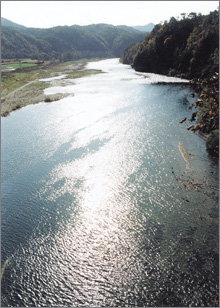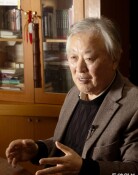Like the River that Runs Down Low

In Yeongwol, Gangwon Province, not only is there the East River but also the West River. A minister, the author of the book (41 years old), lives in an isolated house up on the hill of the Goigol village where the West River runs closely.
He stopped the governments attempt to build a spot for a waste dump near the West River, which was a very appreciative act. However, the one who gives a deep vow of appreciation is the author, because the West River has taught him the truth and wisdom of life. This book contains the records of his learning experiences and appreciation while living together with the river.
Plantain plants teach us that every single nameless plant is really doing a great job of blossoming, rather than ruining a garden. It is gorgeously beautiful looking at those white spot-like pistils and stamens dangled on long and slender tubes.
The author stops sprinkling herbicides as he realizes the beauty of plants. He sees the diverse and marvelous features of life through the weedy grass: violets, whitlow grass, to name a few. Witnessing the struggles against herbicides of the weedy grass, which is considered a nuisance most of the time, in order to establish its own habitat, the author learns about challenging spirit and bravery.
Water, that comes down from the highest place, the sky, never hesitates in coming down to the lowest point. The author learns lessons in modesty from the water, as water is always pleased with its descent. After taking a photo of dew dangling on leaves, he realizes that beauty exists within the open-minded eyes and hearts, but neither in special spots nor exceptional objects. He also learns from the changing fall leaves with all different colors that differences and contrast are the keys of discovering beauty as well, and that they themselves are the entity of wonder and surprise. Additionally, from the hanging leaves with holes created by bugs, he learns about strong will, and that you cant give up an entire whole precious life even when you have part of your life damaged or ruined.
Meanwhile, he didnt learn these lessons for free. He gives his whole body and spirit to nature. He concentrates on his five senses. He lies down to smell the dirt. He gives a big hug to a large oak tree and tries to communicate with the ant climbing up the back of his hand. Watching a grasshopper crunches ants with its sharp mouth and leaves sweat at the end of stems are not scenes that common people easily spot while strolling in the forest.
What distinguishes the author from others is his awe and respect toward life. He says, If you know, you come to love. Knowing is beyond having names of plants and their ecology. That is a simple analysis, from your to my perspective. The author learned that truthful knowing is equal to feeling you with your perspective.
Of course, he would have learned some of the lessons from nature before he experienced them by himself. The difference lies on whether he knew it with his head or with his whole body. It was the West River that gave a breath to his knowledge, which turned to wisdom. They were the common Indian kingfish floating over the surface of the river and plantain plants that were amazingly prolific in showing 117 kinds of plants transformation from 117 kinds of seeds.
The author recommends to those who live the life of speed to stay quiet like the forest. And he teaches us to be pleased with our life and existence. Like pussy willows that exhibit their new white hair during the cold winter, he whispers to us, Beam in the darkness, find hope in despair, and talk about joy in the mood of sorrow. This was what the West River has taught him.
mindy@donga.com
Headline News
- Elderly wealth and independence surge as new senior values
- Bae Jun-ho hopes to introduce more young blood into the team
- N. Korea blows up roads near border with S. Korea as tensions grow
- Samsung Galaxy S24 Ultra tops Consumer Reports’ best smartphone list
- Twin pandas Ruibao and Huibao meet the public for the first time






